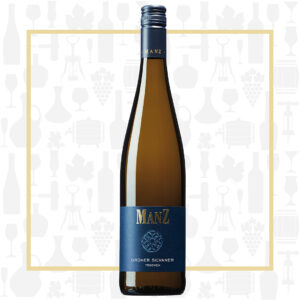Cellar Profile
Weingut Manz is located in the village of Weinolsheim in the northeastern area of Rheinhessen. The Manz family have been winegrowers here since 1725 and today the estate is managed by the 8th generation Manz, Eric. Their vineyard holdings are comprised of 20 hectares dispersed throughout the areas of Oppenheim, Nierstein Weinolsheim, Dienheim and Guntersblum. As is the case with most German producers, their focus is on white wines; Riesling, Pinot Blanc, Pinot Gris, Chardonnay, Silvaner and Gewürztraminer. They also possess small plantings of Pinot Noir and Dornfelder. Like most wineries operating in marginal climates, their annual production varies significantly. On average, they bottle 12,000 cases a year.
Region
Germany’s largest wine region, Rheinhessen was historically known for producing mainly large amounts of bulk wine destined for the export market. In the 1980s, growers gradually began to focus on lower yields, drier styles and overall higher quality wines. Today, the region is home to the majority of Germany’s organic/biodynamic viticulture, with a great number of young and energetic producers eschewing the past and leading the future. Unlike other German wine regions, there are significant plantings of many grapes including Muller-Thurgau, Dornfelder, Silvaner and Pinot Gris, Noir and Blanc, but Riesling plays a role here as well, to be sure. The climate is relatively mild, protected by countless hills and forests and moderated on the east and west border by the Nahe and Rhine rivers, respectively. Soil types vary, though the majority are a mix of loess and loam with limestone deposits mixed with gravel.
Vineyard
Old vine plantings in clay and limestone marl soil. A southwestern exposure ensures full ripeness for development of flavour and complexity. The winery sources from vineyards around the town of Oppenheim, most on steep slopes with excellent drainage.
Varieties
At one time, Silvaner was one of the most planted varieties in Germany and the key component in the forgettable Liebfraumilch being produced at the time. Slowly but surely those vines were replaced by a sea of Muller-Thurgau that had less marked acidity for mass consumption wine. However, in Rheinhessen and Franconcia, as well as in Austria, fine, dry brilliant expressions of Silvaner are still produced. Originally from Austria, it migrated to several other winegrowing regions and is listed as one of the Noble varieties allowed in Alsace Grand Cru (though only in the vineyard of Zotzenberg). Silvaner is best when fully phenolically ripe, where it gives full, flavourful wines with strong acidity and freshness.
Winemaking
Hand-harvested fruit is brought in cool to the winery. Care is taken that the grapes have a clean ferment, with selected yeasts, in temperature-controlled steel vats. The wine spends six months aging on its lees for added complexity, before being lightly filtered and bottled, youthful and exuberant.
Tasting Notes
Inviting aromas of ripe pear, Golden Delicious apple and beeswax. The palate is fresh and lively, but the acid is nicely interwoven with the primary fruit. There is a touch of residual sweetness, but the finish is mineral-driven and dry. Chill lightly and serve with breaded pork chops with apple or chill fully and enjoy as an aperitif.

 info@buyersandcellars.ca
www.buyersandcellars.ca
info@buyersandcellars.ca
www.buyersandcellars.ca